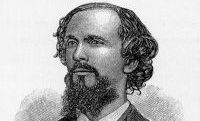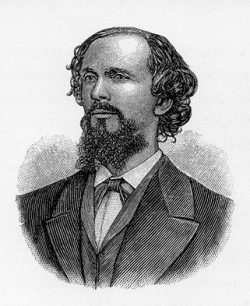Karl Heinrich Ulrichs was "the first gay man in world history". The Berlin initiative "A Street for Karl" wants to dedicate a street to him in the Homokiez neighbourhood. Sign now!
In Berlin, the heroes of modern history do not have it easy posthumously: if streets or squares are named after them, they are often located in unimpressive places. What's more, the newly named memorial sections are often damn short or damn ugly or both.
Two inglorious examples: The "Marlene Dietrich Square" is not much bigger than a towel. Squeezed between McDonald's, H&M and a small-town-smelling casino, it has never managed to develop anything like glamour at any Berlinale. When Leonardo DiCaprio and Martin Scorsese appeared on it in February, it looked as if a car park had been decorated with a red carpet in their honour.
Fifteen years after her untimely death, the GDR's most famous rock star, Silly front woman Tamara Danz, has been assigned a 150-metre-long traffic-calmed zone next to the new O2 Arena on Warschauer Strasse, which is so inhospitable that people don't even want to park there.
The initiative "A Street for Karl" wants to do better. It is run by Dirk Siegfried from the "Working Group of Gay Lawyers" and Gerhard Hofmann, publisher and veteran of the modern gay movement. The two are supported in their project by the Lesbian and Gay Federation (LSVD), the Berlin AIDS service organisation and other organisations.
The initiators have already chosen a street. So far it is called "Einemstraße", after Karl von Einem. As Prussian Minister of War, he called for the extermination of homosexual men in 1907, publicly paid homage to National Socialism in 1931 and cheered on the Third Reich in 1933. The street was named after him immediately after his death in 1934 as an "honour for his life's work".
Today, as then, "Einemstraße" is located in the centre of Berlin's gay neighbourhood Schöneberg, where a "Karl-Heinrich-Ulrichs-Straße" would fit in perfectly. After all, Ulrichs was "the first gay man in world history", as the sex researcher Volkmar Sigusch affectionately puts it.
Ulrichs, who was born in 1825, called for the abolition of anti-homosexual laws at the German Lawyers' Conference in 1867, two years after coming out himself, making him the founding father of the emancipatory movement in Europe. Far ahead of his time and completely on his own, he called for state and social recognition and the opening of marriage to homosexuals.
The lawyer also took a scientific approach to homosexuality, which he saw as a "natural riddle of male love". Between 1864 and 1879, Ulrichs published twelve writings on the subject, which Sigusch describes as the first "modern theory of homosexuality". In these texts, Ulrichs also coined the terms "Urning" for the gay man and "Urninde" for the lesbian.
In 1880, Ulrichs fled into exile in Italy because homosexuals were increasingly persecuted in Prussia. He died in L'Aquila in 1895.
Today, Karl-Heinrich Ulrichs is known and recognised worldwide. In Munich, Bremen and Hanover, squares and a street have been named after him, in L'Aquila there is a "Piazzale Karl Heinrich Ulrichs" and the "International Lesbian and Gay Law Association" has presented the "Karl Award" every three years since 2002 to lawyers who have rendered outstanding services to queer rights.
It is high time that Berlin finally got a "Karl-Heinrich-Ulrichs-Straße". And exactly where the honoured man could go out openly gay back in the imperial era.
In order to emphasise the project, signatures are now being collected. You can sign online, but also in person, for example at the lesbian-gay street festival in Schöneberg this weekend.
(Paul Schulz)
Further information on the "A road for Karl" initiative / Sign online
There is also more information about the project and a fan group on Facebook. Simply enter "Karl Heinrich Ulrichs" and join











